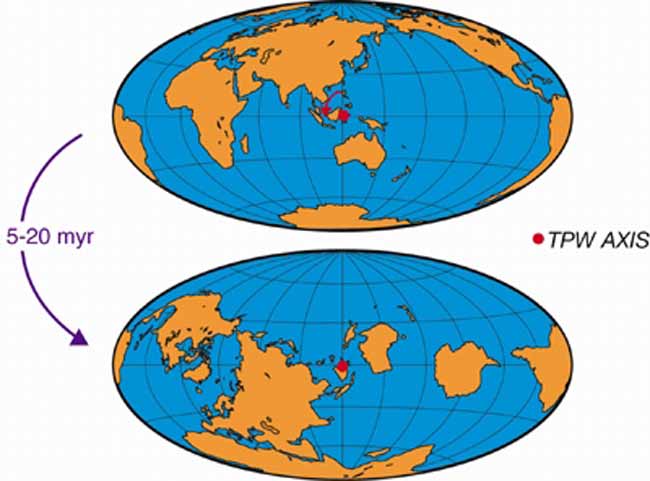The Day The Earth Fell Over

Earth might have spun on its side to keep its balance in the distant past, and could do so again, scientists reported today.
Alaska was suddenly at the equator, the thinking goes. [Graphic]
Scientists already know that the North Pole wanders over time. But a theory known as true polar wander suggests that if a very heavy object, like an oversized volcano forms far from the equator, the force of the planet's rotation would pull the object away from the axis the Earth spins around.
Should a mass such as the very heavy volcano become unbalanced, Earth would tilt and rotate itself until the extra weight moves somewhere near the equator.
Analyzed samples of ancient sediments found in the Norwegian archipelago of Svalbard show that such an event may have indeed happened in the past.
"The sediments we have recovered from Norway offer the first good evidence that a true polar wander event happened about 800 million years ago," said Adam Maloof, an assistant professor of geosciences at Princeton University. "If we can find good corroborating evidence from other parts of the world as well, we will have a very good idea that our planet is capable of this sort of dramatic change."
The evidence
Get the world’s most fascinating discoveries delivered straight to your inbox.
When rock particles sink to the ocean floor, small magnetic grains within the particle align with the magnetic lines of the Earth. These rocks then become records of the Earth's magnetic field at the time that they were pointing.
If a rock has been spun by an unusual geological event, the orientation of its magnetic field will be out of the ordinary.
"We found just such anomalies in the Svalbard sediments," Maloof said. "We made every effort to find another reason for the anomalies, such as a rapid rotation of the individual crustal plate the islands rest upon, but none of the alternatives makes as much sense as a true polar wander event when taken in the context of geochemical and sea level data from the same rocks."
Flowing backwards
The polar wander could also be responsible for the unusual changes that happened in ocean chemistry 800 million years ago.
"Scientists have found no evidence for an ice age occurring 800 million years ago, and the change in the ocean at this juncture remains one of the great mysteries in the ancient history of our planet," Maloof said. "But if all the continents were suddenly flipped around and their rivers began carrying water and nutrients into the tropics instead of the Arctic, for example, it could produce the mysterious geochemical changes science has been trying to explain."
Future work can test directly the true polar wander hypothesis because this type of event would affect every continent in a predictable manner, depending on the continent’s changing position relative to Earth’s spin axis, the researchers report in the Aug. 25 issue of the Geological Society of America Bulletin.
- Top 10 Ways to Destroy Earth
- Even Weather Makes Earth Wobble
- When North Becomes South: New Clues to Earth's Magnetic Flip-Flops
- Old Ship Logs Unlock Secrets About Earth's Magnetic Field
- North Pole Moving to Siberia
 Live Science Plus
Live Science Plus






